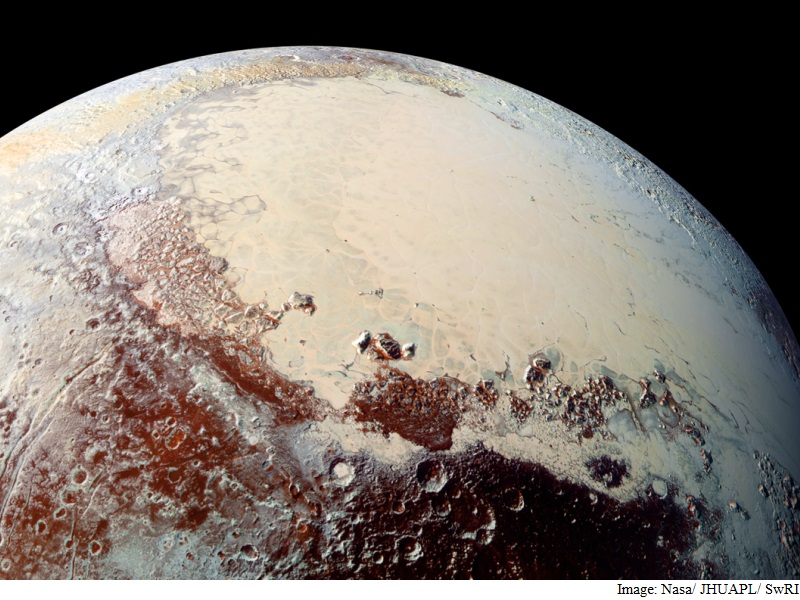- Home
- Science
- Science News
- Nasa's New Horizons Probe Reveals Rich Variety of Colours on Pluto
Nasa's New Horizons Probe Reveals Rich Variety of Colours on Pluto

Pluto contains a rich variety of colors on its surface, according to observations out Thursday from Nasa's New Horizons probe that stunned astronomers.
The probe's first published science results revealed dark red parts at the equator of the dwarf planet to lighter and bluer regions at higher latitudes.
Previously experts did not have a clear picture of Pluto's colors.
"I was astonished to see such spectacular surface color and geological diversity," said Silvia Protopapa, an assistant research scientist in astronomy at the University of Maryland and part of the New Horizons surface composition team.
A new color image of Pluto published in the journal Science was obtained with the spacecraft's Multi-spectral Visible Imaging Camera (MVIC).
On July 14, New Horizons became the first spacecraft to fly by Pluto, offering scientists an unprecedented view of the dwarf planet.
Scientists working on the project have already released most of their observations to the public, but data will continue to pour in for the next year.
"The data returned so far show a surprisingly wide variety of landforms and terrain ages on Pluto, as well as variations in color, composition and albedo (surface reflectivity)," Nasa said.
"Team members also discovered evidence for a water-ice rich crust, multiple haze layers above the surface in Pluto's atmosphere, and that Pluto is somewhat larger and a bit more ice rich than expected."
For the latest tech news and reviews, follow Gadgets 360 on X, Facebook, WhatsApp, Threads and Google News. For the latest videos on gadgets and tech, subscribe to our YouTube channel. If you want to know everything about top influencers, follow our in-house Who'sThat360 on Instagram and YouTube.
Related Stories
- Samsung Galaxy Unpacked 2025
- ChatGPT
- Redmi Note 14 Pro+
- iPhone 16
- Apple Vision Pro
- Oneplus 12
- OnePlus Nord CE 3 Lite 5G
- iPhone 13
- Xiaomi 14 Pro
- Oppo Find N3
- Tecno Spark Go (2023)
- Realme V30
- Best Phones Under 25000
- Samsung Galaxy S24 Series
- Cryptocurrency
- iQoo 12
- Samsung Galaxy S24 Ultra
- Giottus
- Samsung Galaxy Z Flip 5
- Apple 'Scary Fast'
- Housefull 5
- GoPro Hero 12 Black Review
- Invincible Season 2
- JioGlass
- HD Ready TV
- Laptop Under 50000
- Smartwatch Under 10000
- Latest Mobile Phones
- Compare Phones
- Moto G15 Power
- Moto G15
- Realme 14x 5G
- Poco M7 Pro 5G
- Poco C75 5G
- Vivo Y300 (China)
- HMD Arc
- Lava Blaze Duo 5G
- Asus Zenbook S 14
- MacBook Pro 16-inch (M4 Max, 2024)
- Honor Pad V9
- Tecno Megapad 11
- Redmi Watch 5
- Huawei Watch Ultimate Design
- Sony 65 Inches Ultra HD (4K) LED Smart TV (KD-65X74L)
- TCL 55 Inches Ultra HD (4K) LED Smart TV (55C61B)
- Sony PlayStation 5 Pro
- Sony PlayStation 5 Slim Digital Edition
- Blue Star 1.5 Ton 3 Star Inverter Split AC (IC318DNUHC)
- Blue Star 1.5 Ton 3 Star Inverter Split AC (IA318VKU)

















